Hello, fellow lovers of all things green,
I just returned from being with family in Tennessee and Virginia for Thanksgiving, a treasured time. I hope you enjoyed the holiday too. Thanksgiving is about giving thanks, which is timeless and universal. We give thanks for the gifts of life. Of family and friends, those here, and those who have passed on. We give thanks for the bounty of food, shelter, and love. Giving thanks for nature’s glorious gifts as we delve into the holiday season teaches us not to rush things and to treasure the beauty of the world around us.
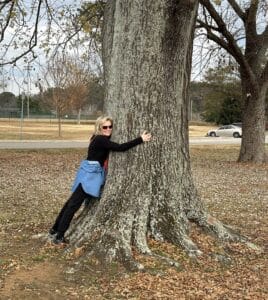
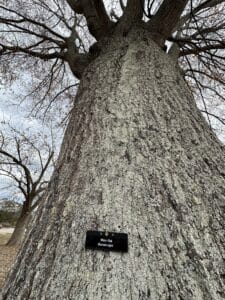
A Grand Water Oak at Lakeshore Park, Knoxville, Tennessee
Giving Thanks for Nature’s Gifts
We’re thankful for the dormant perennials with seed heads that feed our feathered friends, who will surely leave plenty to fall to the ground and germinate come spring. And marvel over the structure and bark of statuesque trees, more visible now, as their dropped leaves decompose and nourish our dear earth for the next seasons of growth.
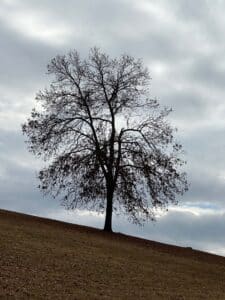
Marvel over the structure and bark of statuesque trees, more visible now.
We treasure the evergreens we can adorn with twinkly lights, the branches of hollies, and other broadleaf evergreens to gather and garnish our window boxes, outdoor pots, and mantels— especially fallen branches along the road. (We spoke about Winter Decorating with “Roadkill” – Roadside Finds – that’ll bring a chuckle.)
Treasure Garden “Leave Behinds”
How lovely dry hydrangea flowers, glossy Honey Locust seed pods, branches with berries, and other garden “leave-behinds” are added to your seasonal display.
What fun to watch critters scurrying around hoarding nuts in preparation for the winter months ahead. And the flocks of turkeys that seem to congregate in masses this time of year, perhaps taunting the fact that they will not be on the dinner table.
Thank you, deer, for staying clear of the hollies during your fall-feeding frenzy with the aid of Deer Out, a natural pleasant-smelling deer spray, and Jolee, who loves the chase, and Ellie, who once did.
Cherish the Unexpected
I’m thankful for surprises like the pre-thanksgiving snow we had a few years back. The following day, the snow softened quickly, fitting for a snowman. I chuckled, imagining my turkey puppet could be the hat.
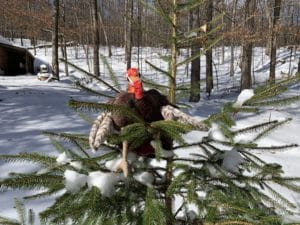
Tom, the Turkey tree topper, would have made Mom smile.
Instead, I retrieved Tom Turkey; the tag was still on him from the day I bought him while visiting dear Sis in Virginia— that last Thanksgiving, Mom was at the table. As I situated the fuzzy fellow like a tree topper on the Norway Spruce that once served as a Christmas Tree, I tried to tuck the tag under his wing. I flipped and turned him every which way.
Mom always left the tags on her stuffed animals because she thought they should be given to a child someday. I yanked the tag, stuffed it in my pocket, and snagged a photo of my handsome tree topper while feeling like a big kid. It would have made Mom smile.
Growing up, Mom made a point of being sure Thanksgiving had our full attention separate from Christmas, a custom I continue. It’s not until after Thanksgiving that we start to deck the halls, unlike holiday promotions that begin before Halloween.
Let’s not Rush Things.
We shouldn’t rush things, although there’s something about planning. Like most things, maybe a balance of both is what we should achieve — without living so much in the future that we lose out on today.
It would make sense to adorn our cherished umbrella pine (Sciadopitys verticillata) with sparkly white lights before the temps drop and fingers freeze. Don’t leave lights on plants all year round, though, as they will grow into the shrubs or trees, harming them.
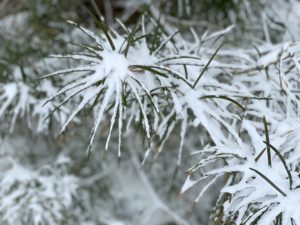
Umbrella Pine, Sciadopitys verticillata
This brings me to a confession — I have yet to do a fall cleanup. It’s hard to get to our gardens after tending to my client’s gardens, which makes for a good excuse. The truth is, I like seed heads and dry foliage through winter. And so does wildlife.
Leave Plants Standing for Wildlife
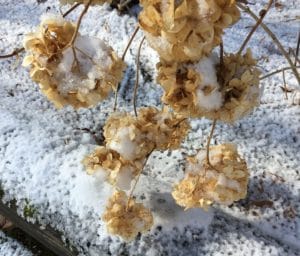
Dry Hydrangea flowers are fabulous over winter.
Coneflower (echinacea) and black-eyed Susans (rudbeckia), when frosted with snow, become charming pompoms in the garden. Astilbe is another favorite left standing. Its feather-like plumes look as beautiful dry as they do in bloom. Leaving plants over winter provides nesting spots for beneficial bugs and food for birds.
If there are perennials you don’t wish for volunteers (it is true rudbeckia has a nickname of Rude Becky for a reason), toss seed heads where feathered friends can feast. Or gather and share them with your two-footed friends to plant in their gardens.
Here’s to giving thanks and sharing the gifts of nature with others to help make our world a more beautiful place.
Garden Dilemmas? AskMaryStone@gmail.com and your favorite Podcast App.
There’s much more to the story in the Gardens Dilemmas Podcast. Including more about the visit to Lakeshore Park in Knoxville, Tennessee. I invite you to tune in:
Links to Related Stories You’ll Enjoy:
Winter Decorating with Roadside Finds
Gentle Strength of Umbrella Pine


